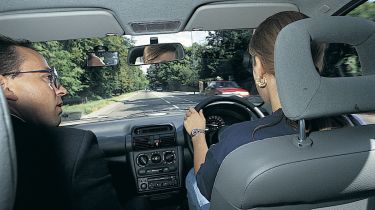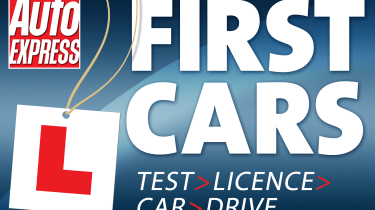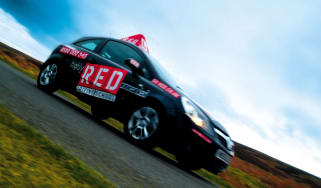Driving test ‘show me, tell me’ questions: top tips
Before you begin your practical driving test, you’ll be asked some ‘show me, tell me’ questions. We reveal all…

Learning to drive is so much more than just mastering the accelerator, brake and clutch or passing the theory test. These days, learner drivers are expected to demonstrate that they understand the basic workings of a car, as well as make a series of simple checks to ensure the car they’re driving is safe, reliable and fit for use on Britain’s roads.
Before you set off on the practical part of your driving test, the examiner will ask you a series of questions called the ‘show me, tell me’ questions. It’s important to spend a few hours revising both ‘show me’ and ‘tell me’ question types before your practical test to give yourself the best chance of success. Thankfully, there are only a few questions you could be asked, the answers to which are easy to learn.
There are two parts to these questions to help prove your knowledge. The ‘show me’ questions will require you to demonstrate the answer to a question such as: ‘show me where you would check the oil level for the car’. ‘Tell me’ questions are answered verbally, where you’ll be asked how you would check something, for example: ‘tell me how you would check the brakes are working before you set off’.
To help you start your driving test off on the right foot, we’ve outlined the ‘show me, tell me’ element of the test in detail below with some example questions. Read on for more information on the type of questions you’re likely to be asked and how to answer them.
What are the ‘show me, tell me’ questions?
As mentioned above, the examiner will ask two questions. The ‘show me’ question will need you to show the examiner how and where on the car they would carry out a particular safety check. This question will be asked before you start driving.
Following this, the ‘tell me’ question will be asked while you are driving. The examiner will ask you to explain how you would carry out a particular safety check. Some of the questions contain both show me and tell me elements but they all follow the same theme.
Should you answer incorrectly, you’ll be awarded one ‘minor’ point in the same way as in the driving test itself. You will be pleased to know that even if you get both wrong you still only get one minor. You are allowed 15 minors before you fail the test.
The questions you’ll be asked are changed by the DVSA (Driving and Vehicle Standards Agency) from time to time, so you’ll need to study for a range of possible questions and answers. At any given time, there are seven ‘show me’ and 14 ‘tell me’ questions in total, but you’ll only be asked two on your test.
Questions can be as simple as; “show me how you would check the horn is working” or more complex. We’ve included a few examples from the DVSA guide below…
Example ‘show me’ questions
All ‘show me’ questions should only be done when it is safe to do so. If you’re parked up, make sure the handbrake is engaged, the engine is off and the car is in a state where you can operate electrical components. This can sometimes be called ‘accessory mode’ or ‘on’.
1. Can you show me how you wash and clean the rear windscreen?
This can vary depending upon make and model of car, but you will normally be able to do this by pulling or pushing the indicator stalk on the right hand side. In other cars, you may need to toggle part of the indicator stalk to start the rear wiper and fluid. Make sure to keep your hands on the wheel at all times and use your fingers to engage the controls.
2. Can you show me how you wash and clean the front windscreen?
Similar to the above, although you will need to pull the indicator stalk on the right hand side towards you to operate the fluid and wipers.
3. Can you show me how you’d switch on your dipped headlights?
This question is built up of two parts, you’ll demonstrate that you can switch between main beam and dipped headlights. Firstly make sure your lights are on, this will be a switch or knob that you use to twist through different types of headlights.
If asked to put on your full beams, you will need to push the left hand indicator away from you, or pull it towards you – depending upon the make and model. A blue light will appear on the dashboard to show you that your full beams are on.
4. Can you show me how you’d set the rear demister?
Turn on the fan and set the air control dials to blow air into the cabin and turn the heat up. Most modern vehicles have a specific button with the icon of a rear windscreen with some wavy lines to help speed up the demisting process.
5. Can you show me how you would demist the front windscreen?
Turn on the fan and set the air control dials to blow air at the front windscreen and turn the heat up. Some models have an electrically heated windscreen operated by a dedicated button in the shape of a windscreen with wavy lines. This will help speed up the process.
6. Can you show me how you’d operate the horn?
Your instructor will expect you to test the horn. Simply push the centre of the steering wheel to show that the horn is working. This doesn’t need to be for long, but just to demonstrate that you can operate it and all road users can hear you. Depending on the make and model, you may have some specific panels which can be depressed to operate the horn – these will have a little horn symbol on them.
7. Can you show me how you’d open and close the side window?
When safe to do so, use your right hand to push the side window buttons on the driver’s side door. These are simple to operate and you will need to open and then close the window.
Example ‘tell me’ questions
'Tell me' questions will only be asked at the start of your test, with the examiner looking for an explanation on how you would carry out a particular safety check before setting off.
1. Tell me how you’d check that the brakes are working before starting a journey.
Answer: The car’s brakes should not feel spongy or slack. They should be tested as you set off on a journey to make sure they stop the car quickly and smoothly. The car should not pull to one side when the brakes are applied.
2. Tell me where you’d find the information for the recommended tyre pressures for this car and how tyre pressures should be checked.
Answer: Look in the manufacturer’s handbook, although some cars have the pressures listed inside the fuel filler cap or the passenger side door. Use a reliable pressure gauge to check pressures and always check and adjust pressures when tyres are cold. Remember to refit the valve caps and don’t forget the spare tyre, if there is one.
3. Tell me how you make sure your head restraint is correctly adjusted so it provides the best protection in the event of a crash.
Answer: The head restraint should be adjusted so that the rigid part of the head restraint is at least as high as your eye or top of your ears, and as close to the back of your head as is comfortable. This should be completed before setting off. Some restraints might not be adjustable, however.
4. Tell me how you’d check the tyres to ensure that they have sufficient tread depth and that their general condition is safe to use on the road.
Answer: There should be no cuts and bulges in the tyres. You should have 1.6mm of tread depth across the central three-quarters of the breadth of the tyre, and around the entire outer circumference of the tyre.
5. Tell me how you’d check that the headlights and tail lights are working. You don’t need to exit the vehicle.
Answer: Explain you’d operate the switch (turn on the ignition if necessary), then walk around the vehicle. Note: while this is a ‘tell me’ question, you don’t need to physically check the lights.
6. Tell me how you’d know if there was a problem with your anti-lock braking system.
Answer: The ABS warning light on the dashboard should illuminate if there is a fault with the anti-lock braking system.
7. Tell me how you’d check the direction indicators are working. You don’t need to exit the vehicle.
Answer: Explain that you’d operate the switch (turn on the ignition if necessary), and then walk around the vehicle. You can then repeat the process with the opposite side indicators activated. Note: as this is a ‘tell me’ question, you don’t need to physically check the lights.
8. Tell me how you’d check the brake lights are working on this car.
Answer: Explain that you’d operate the brake pedal then make use of reflections to the rear of the car in windows or doors to see if the lights are working. Alternatively, you could ask someone to help.
9. Tell me how you’d check the power-assisted steering is working before starting a journey.
Answer: If the steering becomes heavy, the system may not be working properly. Before starting a journey, two simple checks can be made.
Applying gentle pressure on the steering wheel, maintained while the engine is started, should result in a slight but noticeable movement as the system begins to operate. Alternatively turning the steering wheel just after moving off will give an immediate indication whether the power assistance is functioning.
10. Tell me how you’d switch on the rear fog light(s) and explain when you’d use it/them. You don’t need to exit the vehicle.
Answer: Operate the switch (turn on the dipped headlights and ignition if necessary). Check the warning light is on and explain the correct use.
11. Tell me how you switch your headlight from dipped to main beam and explain how you’d know the main beam is on.
Answer: Operate the switch (with the ignition or engine on if necessary), check with the main-beam warning light.
12. Open the bonnet and tell me how you’d check that the engine has sufficient oil.
Answer: Identify the dipstick/oil level indicator and describe how you would check the oil level against the minimum and maximum markers.
13. Open the bonnet and tell me how you’d check that the engine has sufficient engine coolant.
Answer: Identify the high and low level markings on the header tank where fitted, or radiator filler cap, and describe how to top up to the correct level.
14. Open the bonnet and tell me how you’d check that you have a safe level of hydraulic brake fluid.
Answer: Identify the reservoir and check the level against the high and low markings.
Five top tips for driving test ‘show me, tell me’ questions
- ‘Show me’ questions will require you to physically demonstrate to the examiner how to carry out a particular vehicle safety check.
- ‘Tell me’ questions are ones where you must explain what you would do, NOT to act it out as in the ‘show me’ questions.
- Some questions can be similarly worded – make sure you revise the questions and answers – there are 21 of them.
- Be as detailed as you can when responding to a ‘tell me’ question – it shows the examiner you know what you are talking about.
- Talk the examiner through what you are doing when responding to a ‘show me’ question – it shows you are confident in what you are doing, and might even help you remember.
Have you encountered the 'show me, tell me' questions on your driving test? let us know your top tips in the comments section below...
First Cars on Auto Express...

Everything you need to know about learning to drive, getting your driving licence and choosing your first car...
Learning to drive
Passing your driving test
- Driving theory test: everything you need to know
- Hazard perception test: what to expect and how to pass
- Practical driving test: how to pass
- Driving test pass rates explained
- Driving test aids product test
- History of the UK driving test
Getting your first car
- Best first cars for young drivers
- Cheapest cars to insure
- Cheaper car insurance for young drivers: our top tips
For all the latest car news, features, tips and advice, follow Auto Express on Twitter and like us on Facebook...
Find a car with the experts











